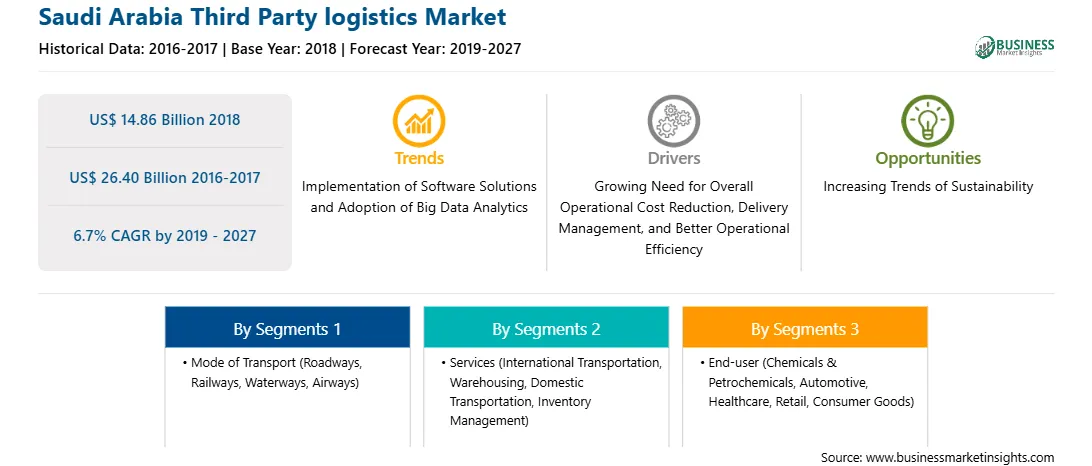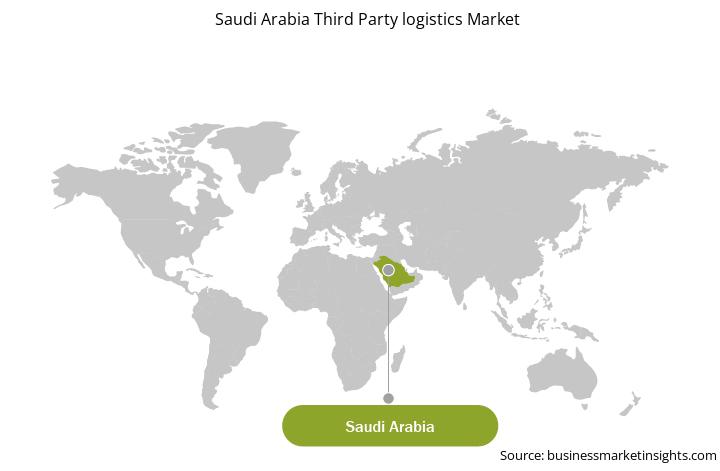Saudi Arabia is one of the largest economy amongst the GCC countries owing to its rich oil reserves and various economy diversification initiatives taken by the Government of the country. As of 2018, the GDP of the country was valued US$ 310 Bn and the population of the country was approximately 23.8 Mn. The country has emphasized on non-oil sectors to create more job opportunities for the youth population of the country. Cities such as Riyadh, Jubail, Yanbu, Ras Al-Khair and Jazan are considered to be the industrial heartlands of the country. The emerging industries and manufacturing hubs of Saudi Arabia include minerals and metal processing center, automotive manufacturing industry, and plastics and packaging industry. Third-party logistics market is gaining immense popularity in Saudi Arabia and is considered as an optimum solution by companies to manage the increasing cross-border flow of goods while expanding the logistics process concept. Companies operating in the country are considering supply chain engineered logistics as an essential means to improve their cash flows, boost their cost savings, and enhance servicing levels for offering their products to market.
Logistics is the core area of the third party logistics (3PL) firms and their proficiency in this areas is always superior to that of the core companies. Since the past few years, Saudi Arabia has made progress for improving its logistics services, and the relevant infrastructure & traceability in order to meet the world-class standards. The processes for import and export processes are more reorganized and governance regulations and structures are being reformed. KSA is also pursuing the public-private partnerships for both, to finance the infrastructure and for acquiring the capabilities from the other leading logistics markets. Furthermore, the country is moving forward towards modernizing airports and expanding air cargo facilities for eliminating the infrastructure bottlenecks. Additionally, for the waterways, the focus on growing port specialization, reforming the governance, and updating the concession frameworks is expected to proliferate the third-party logistics market growth.
One of the disadvantage of opting for 3PL is that it leads the beneficiary companies to loss control over their shipping functions. The client businesses have no direct control over their operation when they use 3PL services. In such cases, businesses are highly dependent upon third party to consistently come through delivering the promised services. Client companies may have to bear certain losses and damage to their business if the 3PL services fail to deliver certain products to the customers on time. Moreover, third-party logistics market firms promote their services in most cost efficient way and the client company has to comply with pricing model specified in the business agreement. However, in certain cases, companies can figure out the cheaper and more efficient solution in their in-house logistics department. The aforementioned factors may hinder the growth of the third-party logistics market.
Transportation is one of the most important service comprised in the 3PL operations and involves physically moving assets and goods in relatively safe manner on right time, in right condition, and in a cost effective manner. The role of transport is ensuring the movement of goods from the point of manufacturer or storage to the point of use or the distribution points to end use. On the basis of mode of transport, the Saudi Arabia third-party logistics market is segmented into roadways, railways, waterways, and airways. The most prominent mode of transport in third-party logistics market accounted for the roadways segment, which is further expected to dominate in the forecast period.
The third-party logistics market is categorized on the basis of various services such as international transportation, warehousing, domestic transportation, inventory management, and others. Domestic transportation service dominated the service segment and is expected to continue its dominance year on year till 2027. Domestic 3PL provides their clients with the similar quality of services that internationally located 3PL companies’ offers to their clients. The technological advancement in 3PL system allow to deliver superior services to the clients irrespective of international or domestic.
The end use segment of third-party logistics market is bifurcated into automotive, healthcare, retail, consumer goods, chemicals & petrochemicals, and others. The third-party logistics market by end-use was led by chemicals & petrochemicals segment which held maximum market share and is anticipated to dominate the market in the forecast period. The need for diversification of the economy of Saudi Arabia from crude oil business to a more sophistical chemicals and petrochemicals industry is a step to secure the economy of the country. Initiatives taken to ensure growth in the petrochemicals sector drive the logistics business for the sector.
Strategic insights for the Saudi Arabia Third Party logistics provides data-driven analysis of the industry landscape, including current trends, key players, and regional nuances. These insights offer actionable recommendations, enabling readers to differentiate themselves from competitors by identifying untapped segments or developing unique value propositions. Leveraging data analytics, these insights help industry players anticipate the market shifts, whether investors, manufacturers, or other stakeholders. A future-oriented perspective is essential, helping stakeholders anticipate market shifts and position themselves for long-term success in this dynamic region. Ultimately, effective strategic insights empower readers to make informed decisions that drive profitability and achieve their business objectives within the market.

| Report Attribute | Details |
|---|---|
| Market size in 2018 | US$ 14.86 Billion |
| Market Size by 2027 | US$ 26.40 Billion |
| Global CAGR (2019 - 2027) | 6.7% |
| Historical Data | 2016-2017 |
| Forecast period | 2019-2027 |
| Segments Covered |
By Mode of Transport
|
| Regions and Countries Covered | Saudi Arabia
|
| Market leaders and key company profiles |
The geographic scope of the Saudi Arabia Third Party logistics refers to the specific areas in which a business operates and competes. Understanding local distinctions, such as diverse consumer preferences (e.g., demand for specific plug types or battery backup durations), varying economic conditions, and regulatory environments, is crucial for tailoring strategies to specific markets. Businesses can expand their reach by identifying underserved areas or adapting their offerings to meet local demands. A clear market focus allows for more effective resource allocation, targeted marketing campaigns, and better positioning against local competitors, ultimately driving growth in those targeted areas.

Market Initiatives was observed as the most adopted strategy in third-party logistics market. Few of the recent market initiatives are listed below;
The List of Companies
The Saudi Arabia Third Party logistics Market is valued at US$ 14.86 Billion in 2018, it is projected to reach US$ 26.40 Billion by 2027.
As per our report Saudi Arabia Third Party logistics Market, the market size is valued at US$ 14.86 Billion in 2018, projecting it to reach US$ 26.40 Billion by 2027. This translates to a CAGR of approximately 6.7% during the forecast period.
The Saudi Arabia Third Party logistics Market report typically cover these key segments-
The historic period, base year, and forecast period can vary slightly depending on the specific market research report. However, for the Saudi Arabia Third Party logistics Market report:
The Saudi Arabia Third Party logistics Market is populated by several key players, each contributing to its growth and innovation. Some of the major players include:
The Saudi Arabia Third Party logistics Market report is valuable for diverse stakeholders, including:
Essentially, anyone involved in or considering involvement in the Saudi Arabia Third Party logistics Market value chain can benefit from the information contained in a comprehensive market report.